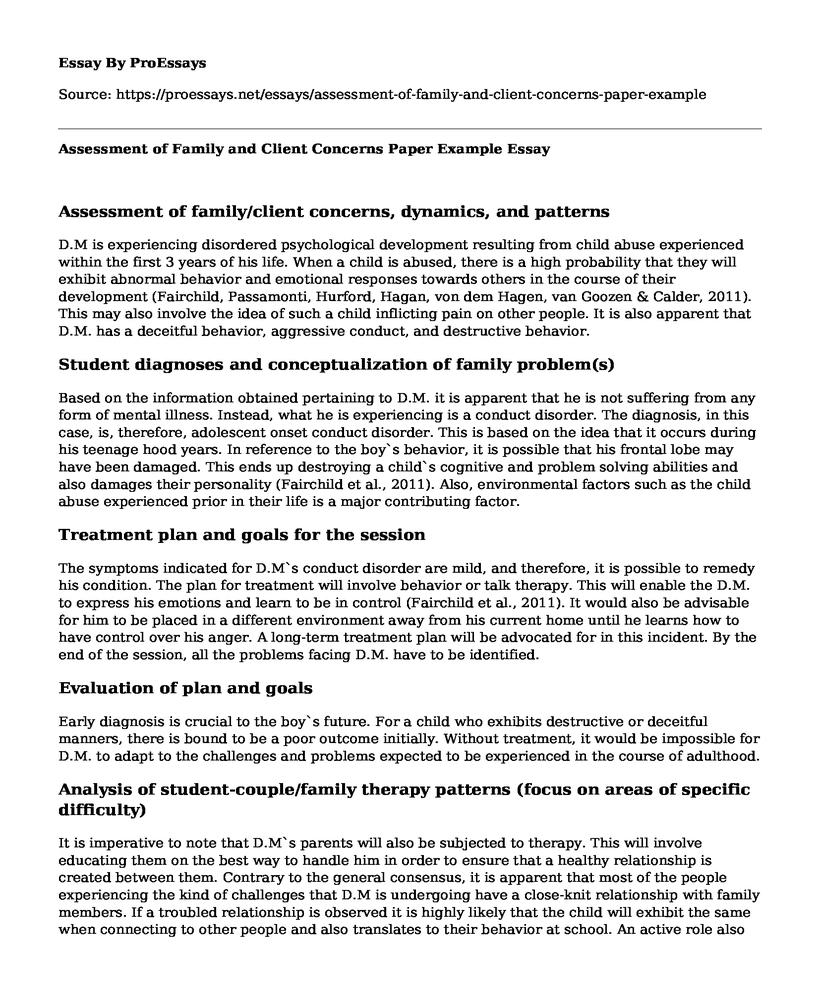Assessment of family/client concerns, dynamics, and patterns
D.M is experiencing disordered psychological development resulting from child abuse experienced within the first 3 years of his life. When a child is abused, there is a high probability that they will exhibit abnormal behavior and emotional responses towards others in the course of their development (Fairchild, Passamonti, Hurford, Hagan, von dem Hagen, van Goozen & Calder, 2011). This may also involve the idea of such a child inflicting pain on other people. It is also apparent that D.M. has a deceitful behavior, aggressive conduct, and destructive behavior.
Student diagnoses and conceptualization of family problem(s)
Based on the information obtained pertaining to D.M. it is apparent that he is not suffering from any form of mental illness. Instead, what he is experiencing is a conduct disorder. The diagnosis, in this case, is, therefore, adolescent onset conduct disorder. This is based on the idea that it occurs during his teenage hood years. In reference to the boy`s behavior, it is possible that his frontal lobe may have been damaged. This ends up destroying a child`s cognitive and problem solving abilities and also damages their personality (Fairchild et al., 2011). Also, environmental factors such as the child abuse experienced prior in their life is a major contributing factor.
Treatment plan and goals for the session
The symptoms indicated for D.M`s conduct disorder are mild, and therefore, it is possible to remedy his condition. The plan for treatment will involve behavior or talk therapy. This will enable the D.M. to express his emotions and learn to be in control (Fairchild et al., 2011). It would also be advisable for him to be placed in a different environment away from his current home until he learns how to have control over his anger. A long-term treatment plan will be advocated for in this incident. By the end of the session, all the problems facing D.M. have to be identified.
Evaluation of plan and goals
Early diagnosis is crucial to the boy`s future. For a child who exhibits destructive or deceitful manners, there is bound to be a poor outcome initially. Without treatment, it would be impossible for D.M. to adapt to the challenges and problems expected to be experienced in the course of adulthood.
Analysis of student-couple/family therapy patterns (focus on areas of specific difficulty)
It is imperative to note that D.M`s parents will also be subjected to therapy. This will involve educating them on the best way to handle him in order to ensure that a healthy relationship is created between them. Contrary to the general consensus, it is apparent that most of the people experiencing the kind of challenges that D.M is undergoing have a close-knit relationship with family members. If a troubled relationship is observed it is highly likely that the child will exhibit the same when connecting to other people and also translates to their behavior at school. An active role also has to be played in order to ascertain that the parents have absolute control at home.
Reference
Fairchild, G., Passamonti, L., Hurford, G., Hagan, C. C., von dem Hagen, E. A., van Goozen, S. H., ... & Calder, A. J. (2011). Brain structure abnormalities in early-onset and adolescent-onset conduct disorder. American Journal of Psychiatry, 168(6), 624-633.
Cite this page
Assessment of Family and Client Concerns Paper Example. (2022, Jun 19). Retrieved from https://proessays.net/essays/assessment-of-family-and-client-concerns-paper-example
If you are the original author of this essay and no longer wish to have it published on the ProEssays website, please click below to request its removal:
- Time-space Constraints and Depression in Education
- Analysis of Fictional Show "13 Reasons Why"
- Famous Teen Counseling: The Teen Star Paper Example
- "Manage Your Emotional Culture" Article Analysis Essay
- Worldview Analysis and Personal Inventory Paper Example
- Organization as the Solution to Fatigue - Essay Sample
- Essay Example on Finding Joy in Life: Different Forms of Happiness for Everyone







